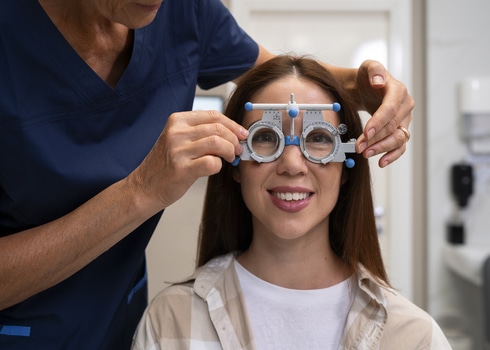Optometrist Downtown is a healthcare professional who specializes in providing vision care services to individuals of all ages. They are trained to diagnose, treat, and manage a wide range of eye-related conditions, which include refractive errors, Binocular Vision Dysfunction(BVD), dry eyes, and glaucoma. Optometrists also play a pivotal role in identifying underlying health issues such as diabetes and hypertension through regular eye health examinations.
Optometrists have in-depth knowledge of the anatomy, physiology, and functioning of the eyes. They utilize a variety of techniques and equipment to examine the eyes thoroughly to determine the appropriate course of treatment. With the help of advanced diagnostic tools such as retinal imagery, visual field testing, and OCT, optometrists can diagnose and treat diseases in the earliest stages.
One of the significant advantages of visiting best Optometrist in Downtown is their ability to provide customized care that meets individual patient needs. They offer a wide array of services that help individuals manage their vision-related problems, which include prescribing eyeglasses or contact lenses, Vision Therapy, and orthokeratology. They work closely with patients to help them achieve optimal visual acuity and manage their eye health conditions effectively.
In conclusion, the Optometrist at Downtown is an essential healthcare professional who plays a critical role in safeguarding and improving the vision of the patient. They provide specialized care that is personalized to meet individual needs, which helps improve the patient’s quality of life.
What Is Optometry?
Optometry is a healthcare profession that is concerned with the eyes and vision. It involves the examination, diagnosis, treatment, and management of disorders and diseases of the eyes and visual system. Optometrists are professionals who specialize in providing primary eye care services, including vision testing, prescribing eyeglasses and contact lenses, and diagnosing and treating certain eye conditions.
Optometrists focus on the visual health of their patients and work to improve their vision and overall quality of life. They assess the visual acuity, or clarity, of their patients’ sight, as well as their ocular health. Optometrists also work closely with opticians and ophthalmologists to provide complete eye care services.
What Does An Optometrist Do?
An optometrist examines patients’ eyes to assess their visual acuity and ocular health. They perform a range of Optometrist Eye Test and measurements to diagnose vision and eye problems so that they can prescribe appropriate treatments or refer patients to other specialists if needed.
Optometrists can prescribe corrective lenses, such as eyeglasses or contact lenses, to improve their patient’s vision. They can also treat common eye conditions, such as dry eye syndrome or conjunctivitis, and provide pre-and post-operative care for patients undergoing eye surgeries.
In addition to testing and treating their patients’ vision and eye health, optometrists also educate their patients on how to maintain good eye health and prevent eye diseases.
Can an Optometrist Diagnose Eye Diseases?
Yes, optometrists are trained and licensed to diagnose eye diseases and disorders. Optometrists use advanced diagnostic tools, such as a slit lamp and ophthalmoscope, to examine the eyes and diagnose eye conditions. Some of the eye diseases that optometrists can diagnose include glaucoma, macular degeneration, cataracts, diabetic retinopathy, and dry eye syndrome.
If an optometrist diagnoses an eye disease, they can provide treatment options or refer patients to an ophthalmologist for advanced care. Early detection and treatment are crucial in preventing vision loss and other complications associated with eye diseases.
How Often Should I Visit An Optometrist?
The frequency of the Optometrist visits depends on an individual’s age, overall health, and specific eye conditions. As a general rule, individuals should have a comprehensive eye exam at least once every two years.
For individuals over the age of 60 or those with a history of eye diseases or conditions, more frequent eye exams may be necessary. Children should have their first Optometrist Eye Test before the age of 3 and should have follow-up exams before starting school and throughout their school years.
It’s important to note that if an individual experiences changes in their vision or eye health, they should see an optometrist immediately rather than waiting for their next scheduled exam.
Who Is The Best Optometrist In Downtown?
Determining the top rated Optometrist Near Me can be subjective and depends on an individual’s specific needs and preferences. It’s recommended to do some research and read online reviews from previous patients to find a reputable optometrist in the area.
One way to find a good optometrist is to ask for recommendations from family, friends, or healthcare providers. It’s also essential to ensure that the optometrist is licensed and has experience in treating your eye conditions.
What Services Do Optometrists Provide?
Optometrists provide a wide range of services, including:
– Comprehensive eye exams
– Diagnosis and treatment of eye diseases and disorders
– Prescribing corrective lenses, such as eyeglasses and contact lenses
– Fitting contact lenses
– Pre- and post-operative care for eye surgeries
Optometrists can also provide additional services, such as sports vision therapy, vision therapy for children, and low vision rehabilitation.
How Much Does an Eye Exam Cost?
The cost of an eye exam can vary based on a few factors, including the optometrist’s location, the complexity of the exam, and any additional tests or services required.
On average, a comprehensive eye exam can cost between $50 to $250. However, this may not include the cost of additional tests or new prescription eyeglasses or contact lenses.
It’s essential to contact your optometrist ahead of time to inquire about pricing and any potential insurance coverage.
What Should I Expect During an Eye Exam?
During a comprehensive eye exam, an optometrist will evaluate your overall eye health and vision. This includes examining you:
– Visual acuity
– Refractive error, or the ability to focus light on the retina
– Eye muscles and movements
– Color vision
– Peripheral vision
– Intraocular pressure
– Retina and optic nerve health
The optometrist may also perform additional tests, such as a visual field test, a slit-lamp examination, and a dilated eye examination, to assess your ocular health thoroughly.
After the exam, the optometrist will share their findings with you, answer any questions you may have, and suggest appropriate treatment options if necessary.
How Can I Find a Reputable Optometrist in Downtown?
Finding a reputable optometrist from downtown can be a daunting task, but there are a few tips to help narrow down the search. Consider the following steps:
– Ask for recommendations from family, friends, or healthcare providers.
– Check online review sites, such as Google or Yelp, to read reviews from previous patients.
– Verify that the optometrist is licensed and has experience in treating your specific eye conditions.
– Check if the optometrist accepts your insurance or offers payment plans.
Taking the time to research and locate the top rated Optometrist Near Me can provide peace of mind and ensure high-quality eye care.
What Is Involved In a Contact Lens Fitting?
A contact lens fitting is a specialized evaluation that determines the right type of contact lens for an individual. During the fitting, an optometrist will evaluate the individual’s cornea and tear film to determine the most suitable type of contact lens.
The fitting process typically includes:
– Measuring the curvature and size of the cornea
– Assessing the individual’s tear film thickness and quality
– Determining the appropriate material and design of the contact lens
– Fitting the contact lens and evaluating its comfort and effectiveness
– Instructing the individual on how to care for and wear the contact lens properly
It’s essential to follow the optometrist’s instructions carefully to avoid eye irritation, infection, or other complications.
Can an Optometrist Prescribe Eyeglasses or Contact Lenses?
Yes, optometrists can prescribe corrective lenses, including eyeglasses and contact lenses. Optometrists can perform a comprehensive eye exam to determine the proper prescription strength and provide guidance on the type of lenses that will work best for an individual.
After the exam, optometrists can also fit contact lenses and provide guidance on proper care and use.
What Are Some Common Eye Conditions?
Some common eye conditions that optometrists treat include:
– Myopia, or nearsightedness
– Hyperopia, or farsightedness
– Astigmatism, or an uneven curvature of the cornea
– Presbyopia, or difficulty seeing near objects in middle-aged and older individuals
– Dry eye syndrome, or a lack of sufficient tear production
– Conjunctivitis, or pink eye
– Cataracts, or a clouding of the eye’s natural lens
– Age-related macular degeneration, or the deterioration of the retina in older adults
– Glaucoma, or damage to the optic nerve due to high intraocular pressure
– Diabetic retinopathy, or damage to the retina due to diabetes
How Can I Improve My Eye Health?
To improve and maintain good eye health, consider the following tips:
– Attend regular eye exams to detect and treat any potential eye problems early.
– Follow a healthy diet that includes foods rich in vitamins A, C, E, and omega-3 fatty acids.
– Wear sunglasses with 100% UV protection to protect your eyes from harmful UV rays.
– Use protective eyewear when playing sports or performing work that involves exposure to chemicals or flying debris.
– Take regular breaks when using digital devices for long periods to avoid eye strain and fatigue.
By practising good eye health habits and staying aware of any changes in your vision, you can maintain good vision and ocular health throughout your life.
Conclusion
In conclusion, an optometrist is an important medical professional who specializes in the diagnosis, treatment, and prevention of eye diseases and visual disorders. An optometrist can provide comprehensive eye exams to detect any potential vision problems or eye diseases and prescribe corrective lenses or other treatments as necessary.
When it comes to finding an optometrist Downtown, it’s important to do your research and find a reputable professional who is experienced and knowledgeable. By making regular visits to your optometrist, you can protect your vision and ensure that any potential problems are caught early and treated appropriately.
Overall, if you live or work Downtown and are in need of vision care services, finding a qualified optometrist should be at the top of your list. With the right provider by your side, you can maintain healthy eyes and clear vision for a lifetime.



